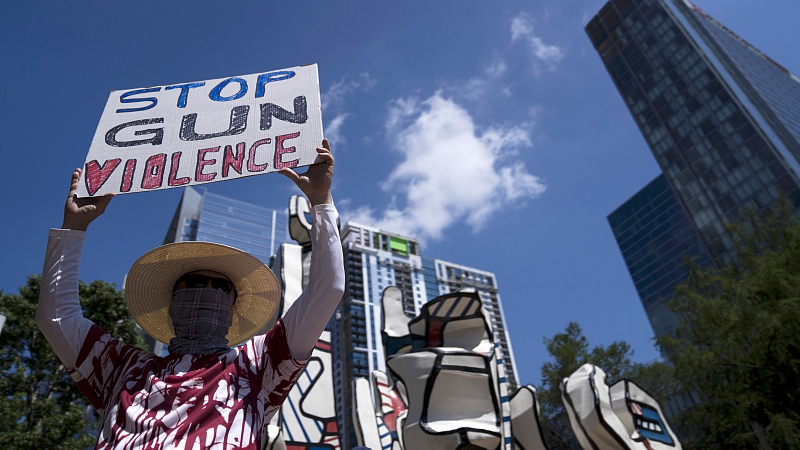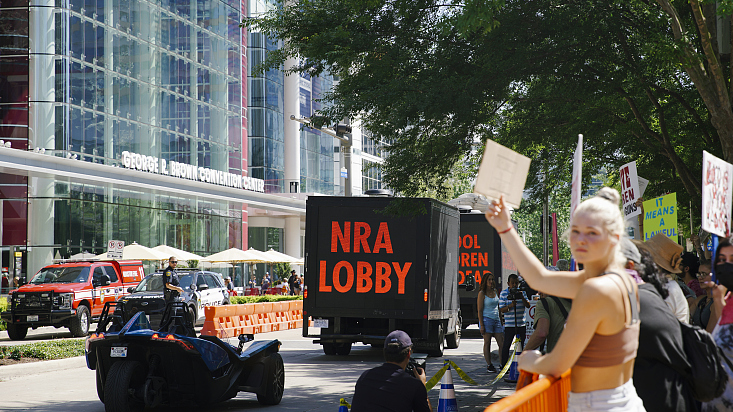
Gun control advocates hold signs during a protest at Discovery Green across from the National Rifle Association Annual Meeting at the George R. Brown Convention Center in Houston, Texas, U.S., May 27, 2022. /CFP
Gun control advocates hold signs during a protest at Discovery Green across from the National Rifle Association Annual Meeting at the George R. Brown Convention Center in Houston, Texas, U.S., May 27, 2022. /CFP
Editor's note: Nadim Siraj is the author of Secret Notes from Iran: Diary of an Undercover Journalist, a co-founder of news platform EmpireDiaries.com, and an India-based journalist who writes on conflict and current affairs. The article reflects the author's opinions, and not necessarily the views of CGTN.
Another mass shooting, this time at July 4 parade near Chicago. Another cycle of outrage. Another spell of fierce TV debates. The grim story of gun violence in America continues to play out in an unending loop.
As the U.S. moves from one horrific mass shooting to another, a close look at why it is caught in this vicious cycle reveals a combination of five disturbing factors – the stance of the National Rifle Association (NRA), the firearms industry, the people's obsession with their right to own guns, violence-themed video games, and U.S. imperialism. Let's look at why the epidemic of mass shootings continues.
In the shadow of NRA
The country had barely recovered from the May 24 mass shooting at a school in Uvalde, Texas, in which 21 people were gunned down, when the Independence Day shooting took place at a parade in Highland Park, Illinois. A 22-year-old man climbed onto a rooftop and shot down six spectators taking part in the Independence Day celebrations. The script was similar to a long list of recent gun attacks.
Recently, the firearm advocacy group NRA had hosted its annual convention, in Houston, Texas, only a few days after the Uvalde shooting. Those who spoke at that event had slammed the killings but conveniently stated that owning guns was not the problem.
"The existence of evil in our world is not a reason to disarm law-abiding citizens… The existence of evil is one of the very best reasons to arm law-abiding citizens," former U.S. President Donald Trump told the gathering.
Guns, dollars, and profits
The NRA's doggedness leads us to the story of how the domestic weapons industry makes massive profits. The Trace, an investigative news website that tracks gun violence in the U.S., recently made a chilling revelation.
It found that firearm companies pocketed $3 billion since the start of the pandemic. The firms exceeded the earnings they made in previous years, thanks to record sales of guns and ammo. The investigation points to four ammunition companies as the top profiteers, namely, Olin Corporation; Smith & Wesson; Sturm, Ruger & Co.; and Ammo, Inc.
Too much money is at stake for the gun lobby to loosen its vice-like grip on the U.S. government, which is facing calls from gun-control groups to pull the plug on the domestic firearms business.

Protesters rally outside of the NRA convention in Houston, Texas, U.S., May 28, 2022. /VCG
Protesters rally outside of the NRA convention in Houston, Texas, U.S., May 28, 2022. /VCG
The 'wrong' constitutional 'right?'
Another factor fueling gun violence is the national obsession to own firearms just because it is a constitutional right. American citizens swear by the Second Amendment of their Constitution, which says, "A well-regulated Militia, being necessary to the security of a free State, the right of the people to keep and bear Arms shall not be infringed."
As a cascading effect of this right, U.S. residents possess 46 percent of all civilian-owned firearms in the world, according to a 2018 study by the Geneva-based monitor Small Arms Survey. Americans own 393.3 million firearms out of a global total of 857 million.
The report shows the U.S. is the only country where civilians own more than one gun per head. Every 100 American residents possess 120.5 guns on average. War-hit Yemen is a distant No. 2 with 52.8 guns per 100 residents, followed by Montenegro (39.1), Serbia (39.1), and Canada (34.7).
Games people play
A factor often speculated to drive gun violence is the following for violence-themed video games. The gaming industry and many journals insist there is no link between gaming and mass shootings. But the debate keeps raging.
After a deadly mass shooting in Buffalo, New York, on May 14, Fox News anchor Jon Scott reopened the case against violent games, wondering aloud if it "de-sensitize people to the actual results of pulling a trigger."
In 2017, a task force formed by the American Psychological Association (APA) found that exposure to violent video games was linked to aggressive behavior and thoughts. In an investigative study by Craig Anderson and Karen Dill, the authors concluded that video games are "potentially more dangerous than the more heavily investigated TV and movie media."
Mindset of imperialism
The government's aggressive foreign policy, too, perhaps steers the collective national psyche towards weaponization. Apart from wars and interventions in Vietnam, Cuba, Iraq, Afghanistan, Syria, Libya, and Yemen, the U.S. military has about 750 bases in at least 80 countries, colonies, and territories. From encircling China to intimidating Russia, Pentagon's tentacles are almost everywhere. The U.S. has nearly three times as many foreign bases as all other nations combined.
Take the example of U.S. domination of the global arms trade. Swedish arms monitor Stockholm International Peace Research Institute (SIPRI) says America's share in worldwide weapons exports is 39 percent. Between 2017 and 2021, U.S. weapons exports were more than double those of Russia, the second-biggest exporter.
Then there's the case of U.S. defense contractors controlling the weapons sale market. Between 2018 and 2020, the top five companies in the world in terms of arms sales were all U.S.-based businesses, according to SIPRI.
A deep-rooted cultural problem?
Is it possible that this distinctly American culture of household-level weaponization to state-level interventionism could make some citizens paranoid and prone to gun violence?
Gun-control activists believe America can lift itself from the quagmire if it follows the examples set by some other democracies.
Canada has brought legislation pitching a freeze on handgun ownership. Australia tightened its gun laws back in 1996. Japan stands out for its gun-control measures. In the UK, Israel, and Norway, strict gun-ownership rules are in place.
While mass shootings have reportedly hit near-record numbers this year, there's been some cheer after the U.S. Senate recently passed a landmark gun safety bill.
But gun violence could continue to be an integral part of American life until the country untangles itself from a web of obsession with guns, firearms profiteering, an interventionist mindset, and a deep-rooted culture of weaponization.
(If you want to contribute and have specific expertise, please contact us at opinions@cgtn.com. Follow @thouse_opinions on Twitter to discover the latest commentaries in the CGTN Opinion Section.)

